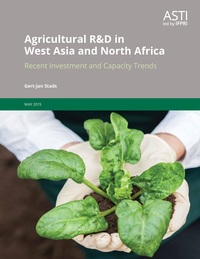Authors:
Gert-Jan Stads
Year:
2015
Publisher
International Food Policy Research Institute.
Back to:
Countries in West Asia and North Africa (WANA) share a number of common challenges, including rapid population growth, progressive exploitation and exhaustion of water resources, land degradation, and the adverse consequences of climate change. Moreover, lack of political stability constitutes a key barrier to food security and economic development in a large number of countries. Importing roughly half of its food needs, WANA is the most food-import-dependent region of the world. To respond effectively to all of these challenges, agricultural productivity in WANA needs to be accelerated without delay.
To succeed in generating the targeted research outputs needed to accelerate this agricultural growth, the countries of WANA need sufficient, sustainable funding of strategic agricultural research programs in alignment with national and regional priorities, combined with talented, well-trained researchers conducting activities within an innovative yet efficient environment that motivates them. A few countries are succeeding in this this regard, and many can be said to have increased their commitment and made valuable progress since the 2008 global food crisis. Nevertheless, many countries are still struggling with inadequate systems, funding, and human resource capacity.
This report assesses trends in investments and human resource capacity in agricultural R&D in 11 WANA countries, focusing on developments during 2009–2012. It demonstrates that despite increased allocations to agricultural research by a number of countries in recent years, agricultural R&D spending in most countries remains below the levels required to sustain their agricultural sectors’ needs. National governments urgently need to address this underinvestment if they are to secure a strategic program of effective research activities that yields increased agricultural productivity.
Other key findings of the report include:
- Agricultural R&D funding in WANA countries is extremely undiversified, with national governments financing the bulk of research activities, and donors and the private sector playing a negligible role in most countries.
- Across WANA, a very large number of highly experienced researchers will be retiring in the short to medium term. Without adequate succession strategies and training, this will create significant knowledge gaps and concerns about the quality of future research outputs.
- In a large number of countries, significant discrepancies exist in the remuneration, working conditions, and incentives offered to researchers employed at national agricultural research institutes (NARIs) compared with their university-based colleagues. These inequities need to be eliminated or overcome to enable NARIs to attract, retain, and motivate well-qualified researchers.
Taking into account the various challenges related to agricultural R&D funding, human capacity, outputs, and institutional structure, the report outlines a number of policy implications for the region’s national governments.

